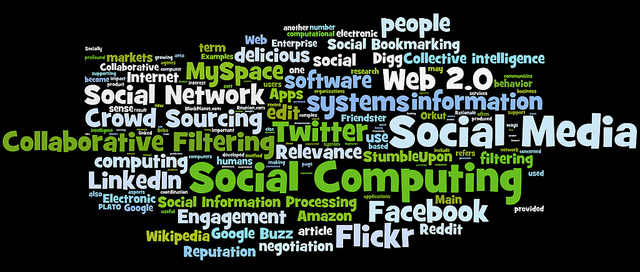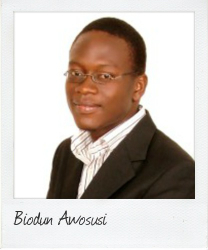"Social media has the capacity to change our world"
February 28th, 2013Social media networks have enough users to populate a continent, writes Biodun Awosusi, 27, a Commonwealth Correspondent from Nigeria. Even as its many platforms evolve, social media is bringing people together and powering organizations, marketing and government.
Our world is changing fast. Social media informs many aspects of our life. The technology has transformed every facet of our lives.
According to social media expert Craig Smith, Facebook has become a continent, with 1.06 billion monthly active users and 680 million mobile users as of February 2013. Google+ has 343 million active users and Twitter pulls 500 million users. YouTube has 800 million users and generates 4 billion views per day. These figures show many of us now live our lives on social media. It is definitely powerful.
What is social media?There is no specific definition. Many people have tried to define the concept but I like Heidi Cohen’s description:
“Social media are the platforms that enable the interactive web by engaging users to participate in, comment on and create content as means of communicating with their social graph, other users and the public,” Cohen says.
Simply put, there is a platform to engage others through social media. Examples of platforms are Facebook, Flickr, Twitter, MySpace, blogs, SharePoint and YouTube. What we share includes text, pictures, audio, videos, and slides.
Social media was effectively used to power the revolution that swept through the Middle East. It culminated in the dethronement of dysfunctional governing structures that long enslaved the people. Facebook, Twitter and YouTube played major roles in galvanizing activists and volunteers for the protests. It facilitated international support and fostered strategic meetings. That is how powerful social media has become. It is therefore important for individuals and organizations to understand social media, and use it to achieve strategic objectives.
“Social Media is a new marketing tool that allows you to get to know your customers and prospects in ways that were previously not possible,” says marketing expert Marjorie Clayman, giving another reason no organization can afford to ignore social media.
“This information and knowledge must be paid for with output of respect, trustworthiness, and honesty. Social media is not a fad, but I also think it’s just the beginning of the marketing revolution – not the end,” Clayman says.
This logic informs Social Media Week, powered by Nokia across the world. The Lagos event just ended. It brought together people from all walks of life. Some wanted to know how social media works, and others were willing to share their experience of how they have effectively used social media to achieve organizational objectives. It was a deeply insightful event for participants.
Several organizations are already harnessing the power of social media to promote their course. The United Nations is leading high-level meetings among stakeholders to develop a meaningful framework for global development beyond 2015. Ongoing discussions on the post2015 agenda include contributions from people from a wide variety of fields and backgrounds – all through social media. People from across the world have the rare opportunity to contribute to development via tweets and participation in online discussions enabled by social media.
Virtually every government including the White House has a Twitter handle to share useful information with the public. The World Bank has announced a search for a social media intern. Recently, Atlas Corps Fellow and environmentalist Esther Agbarakwe held a debate on Twitter on the question: ‘can social media save our world?’ The preponderance of opinion among panelists and participants reveals that social media has the capacity to change our world, if properly used.
“Social media is today’s most transparent, engaging and interactive form of public relations. It combines the true grit of real time content with the beauty of authentic peer-to-peer communication,” according to Lisa Buyer.
“Social media allows us to network, to find people with like interests, and to meet people who can become friends or customers. It flattens out the world and gives us access to people we never would have been able to meet otherwise,” adds PR Expert Gini Dietrich.
As our world flattens with social media, we must harness its power to make the world a better place.
Reference: Smith, Craig. (Feb. 2013) How Many People Use the Top Social Media, Apps & Services?
Photo credit: <a href=”http:www.flickr.com/photos/29148810@No5/5440728270/”daniel_iversen</a>via<a href=”http://photopin.com”,/a><a href=”http://creatiecommons.org/licenses/by/2.0″>cc</a>
…………………………………………………………………………………………………………………
About me:
I am a highly motivated young medical doctor, content developer, youth development expert and social entrepreneur and an alumnus of the inaugural Discovering Young Leaders Program (DYLP 2012) of Commonwealth Youth Programme-Africa. I was a task force member for the Youth Summary of the UNESCO EFA 2012 Report and a postgraduate student of the UniversityofLiverpool, where I am studying International Management of Health Systems.
…………………………………………………………………………………………………………………
Opinions expressed in this article are those of the author and do not necessarily represent the views of the Commonwealth Youth Programme. Articles are published in a spirit of dialogue, respect and understanding. If you disagree, why not submit a response?
To learn more about becoming a Commonwealth Correspondent please visit: http://www.yourcommonwealth.org/submit-articles/commonwealthcorrespondents/
…………………………………………………………………………………………………………………





